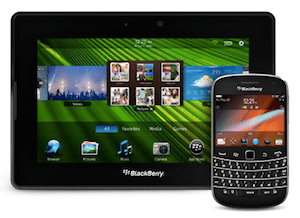The folks at RIM can see the writing on the wall — they’ve historically enjoyed plenty of enterprise love, but the recent “bring your own device” trend means headaches not only for RIM, but for the companies that have to manage all of them. In a move to hang on to relevance in the business market, the Waterloo company has officially released their Mobile Fusion device management platform, which aims to simplify how businesses manage a fleet of iOS, Android, and BlackBerry devices.
Thoughtful readers may recall that RIM first announced their Mobile Fusion service way back in November 2011, at which point they described it as a means for IT departments to manage those myriad devices from a single web-based “control room.” From their console, admins will be able to (among other things) remotely enable access to email and contacts, manage lost hardware, establish security policies, and push notifications to the user.
Interestingly, RIM has made Mobile Fusion free to download, and instead charges customers for each device managed — individual access licenses will run $99 per device, though RIM has attempted to sweeten the deal by offering the first 60 days of service free of charge. Considering that the service is focused on making external device management more cost-efficient (especially when these companies get to spend less money on tricking their employees out with company-owned devices), that free trial should give Mobile Fusion some much-needed momentum.
Mobile Fusion seems like a nifty tool to add to a IT administrator’s arsenal, but it’s at best a bandage over RIM’s gaping wounds. Their most recent earnings call revealed some pretty dismal numbers, and their portfolio of BlackBerry 7-powered devices are getting a bit long in the tooth, especially when compared to the sorts of high-powered handsets that Mobile Fusion packs full support for. The first BB10 handsets aren’t expected to hit store shelves until later this year (developer devices not withstanding), and the competition will only be tougher by then. With Android devices continually pushing the limits of hardware and design, and another iPhone right around the corner, RIM can’t afford to put out more lackluster hardware.
